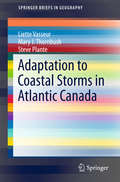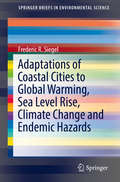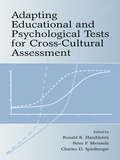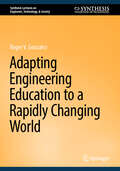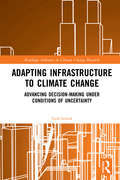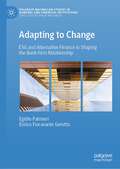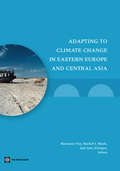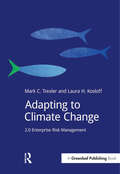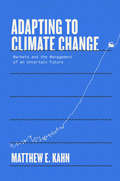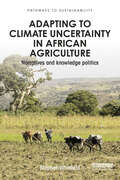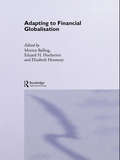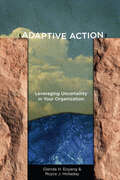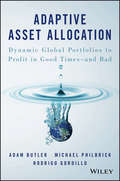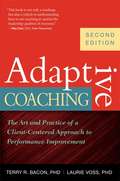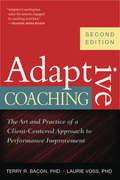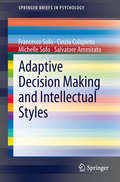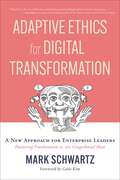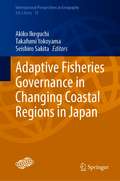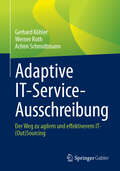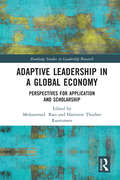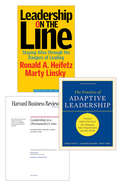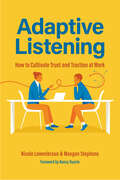- Table View
- List View
Adaptation to Coastal Storms in Atlantic Canada (SpringerBriefs in Geography)
by Mary J. Thornbush Liette Vasseur Steve PlanteThis Briefs is based on an analysis that was performed on the 2010 winter storms that caused considerable damage to coastal communities in Atlantic Canada. The hazards that occurred were associated with storm surge, coastal erosion, and flooding. The analysis covered a large multi-site longitudinal project, where a participatory action research (PAR) approach was used to understand how people in nine coastal communities perceive and experience extreme weather events and to enhance their capacity to adapt and improve their resilience. This Briefs exposes the outcome of two series of interviews and activities that were conducted during the project, as well as the lessons learned, and general elements that should be considered when researchers collaborate with communities to define adaptation and resilience strategies. It makes an important contribution to the application of PAR as an integrated (social-ecological) approach to resilience and how such an approach [. . . ] can be adapted also to other communities.
Adaptation, Specialization, and the Theory of the Firm
by Birger WernerfeltThis invaluable book provides the foundations for a new theory of the firm, drawing on Birger Wernerfelt's landmark work on economic theory and the resource-based view of the firm. It addresses a vigorous and long-standing academic debate over what exactly a 'firm' is, both in the field of management and economics. Wernerfelt revisits his classic articles, including an extensively revised 'A Resource-Based View of the Firm' (1984), which have been updated and synthesized to provide precise and accessible concepts and predictions. By offering future directions for research and practice, this book will be of interest to students and scholars of management and economics alike.
Adaptation: Strategies for Global Value Creation
by Pankaj GhemawatThis chapter focuses on adaptation strategies for adding value in the face of large cross-border differences, exploring in detail the strategies of the world's ten largest competitors in the major home appliance industry. This chapter was originally published as chapter 4 of "Redefining Global Strategy: Crossing Borders in a World Where Differences Still Matter."
Adaptations of Coastal Cities to Global Warming, Sea Level Rise, Climate Change and Endemic Hazards (SpringerBriefs in Environmental Science)
by Frederic R. SiegelThis book discusses the identification of, solutions to, and management of threats to high population coastal cities and their seaports from global warming, climate change and endemic hazards. These include prevention of sea water intrusion of freshwater coastal aquifers, emplacement of barriers that mitigate the threats from sea level rise, and inundation of urban centers plus those from storm surges that cause flooding and salination of inshore terrain. The book assesses mitigation of the effects of extreme weather events such as drought, and major flooding from heavy rainfall on coastal urban centers, or on associated drainage basins. It also considers how coastal cities can counter vulnerabilities from other physical hazards (e.g., earthquakes - building codes) and health hazards (e.g., pollution, public health response - preparedness) that may be related to a city’s geological/geographical location and service as a port of entry for goods and travelers (regional and international). The book also cites the high costs of safeguarding citizen and municipal assets, but notes possible sources of potential funding especially from less developed and developing nations. The book is written to give strong background information to students majoring in environmental sciences or those in other majors with interests in the effects of global warming/climate change, and will be of interest to social scientists, think tank personnel, government planners, and lay persons in environmentally oriented organizations.
Adapting Educational and Psychological Tests for Cross-Cultural Assessment
by Ronald K. Hambleton Charles D. Spielberger Peter F. MerendaAdapting Educational and Psychological Tests for Cross-Cultural Assessment critically examines and advances new methods and practices for adapting tests for cross-cultural assessment and research. The International Test Commission (ITC) guidelines for test adaptation and conceptual and methodological issues in test adaptation are described in detail, and questions of ethics and concern for validity of test scores in cross-cultural contexts are carefully examined. Advances in test translation and adaptation methodology, including statistical identification of flawed test items, establishing equivalence of different language versions of a test, and methodologies for comparing tests in multiple languages, are reviewed and evaluated. The book also focuses on adapting ability, achievement, and personality tests for cross-cultural assessment in educational, industrial, and clinical settings. This book furthers the ITC's mission of stimulating research on timely topics associated with assessment. It provides an excellent resource for courses in psychometric methods, test construction, and educational and/or psychological assessment, testing, and measurement. Written by internationally known scholars in psychometric methods and cross-cultural psychology, the collection of chapters should also provide essential information for educators and psychologists involved in cross-cultural assessment, as well as students aspiring to such careers.
Adapting Engineering Education to a Rapidly Changing World (Synthesis Lectures on Engineers, Technology, & Society)
by Roger V. GonzalezRapid technological advancements, globalization, and environmental concerns impact the role of engineers in today’s society. The book emphasizes the role and contribution of engineers to society, and the importance of engineering education. However, to better prepare engineers, for the challenges and opportunities of their profession, engineering education must change. This book begins by comparing the systems of engineering education in the United States and the United Kingdom, in terms of program structure, students, academics/faculty, and external factors. This comparison provides context to the discussion of the leadership role engineers should play and how engineering education should prepare students for leadership. The focus of the second part of the book is on the important role of professional development in engineering education and on broadening access to and participation in these programs. The author explains that engineering education programs must be redesigned to meet industry needs and to allow future engineers to achieve career success. To do so, in addition to traditional topics in science and engineering, programs should help students develop professional and managerial skills including communication, project management, analytical, and problem-solving skills. The final part of the book is dedicated to exploring how accelerated technological developments including artificial intelligence, require that engineering programs adapt, in order to remain relevant.
Adapting Infrastructure to Climate Change: Advancing Decision-Making Under Conditions of Uncertainty (Routledge Advances in Climate Change Research)
by Todd SchenkMany of the challenges that decision-makers grapple with in relation to climate change are governance related. Planning and decision-making is evolving in ambiguous institutional environments, in which many key issues remain unresolved, including relationships between different actors; funding arrangements; and the sources and procedures for vetting data. These issues are particularly acute at this juncture, as climate adaptation moves from broad planning processes to the management of infrastructure systems. Concrete decisions must be made. Adapting Infrastructure to Climate Change draws on case studies of three coastal cities situated within very different governance regimes: neo-corporatist Rotterdam, neo-pluralist Boston and semi-authoritarian Singapore. The book examines how infrastructure managers and other stakeholders grappling with complex and uncertain climate risks are likely to make project-level decisions in practice, and how more effective decision-making can be supported. The differences across governance regimes are currently unaccounted for in adaptation planning, but are crucial as best practices are devised. These lessons are also applicable to infrastructure planning and decision-making in other contexts. This book will be of great interest to scholars of climate change and environmental policy and governance, particularly in the context of infrastructure management.
Adapting to Change: ESG and Alternative Finance in Shaping the Bank-Firm Relationship (Palgrave Macmillan Studies in Banking and Financial Institutions)
by Egidio Palmieri Enrico Fioravante GerettoThis book examines the evolving dynamics between banks and firms within the context of alternative finance and Environmental, Social, and Governance (ESG) integration. The book contributes to understanding the bank-firm relationship in light of the changing financial landscape and its implications for sustainable development. The book employs an empirical analysis to examine the bank-firm relationship in the context of alternative finance and ESG performance to assess firms’ riskiness, access to funds and cost of capital. The book addresses research gaps by comprehensively analysing the impact of alternative finance and ESG on the bank-firm relationship. It assists banks in adapting their financing practices and policies to align with emerging trends, and it offers insights for banks to evaluate and mitigate ESG-related risks effectively. It provides policy implications for promoting responsible lending, supporting the growth of alternative finance, and incentivising ESG integration in the financial sector. Ultimately, it contributes to formulating policies that foster a sustainable and inclusive financial system, and will be of interest to professionals and researchers in finance, alternative finance, and sustainable finance.
Adapting to Climate Change in Eastern Europe and Central Asia
by Marianne Fay Jane Ebinger Rachel BlockThe region of Eastern Europe and Central Asia (ECA) is already experiencing the consequences of climate change: increasing variability, warmer temperatures, altered hydrology. Events such as droughts, floods, heat waves, windstorms, and forest fires are increasing in number and severity. The concentration of greenhouse gases already in the atmosphere guarantees that similar or greater changes are yet to come-even if the world were to completely stop emitting CO2 today. This region is particularly vulnerable because of its legacy of socioeconomic issues, environmental mismanagement, aging infrastructure and housing, and under-investment in hydrometeorological, rural, and health institutions. The resulting adaptation deficit will exacerbate climate risks and hamper the ability of sectors that could gain from climate change, such as agriculture, to reap the full benefits. 'Adapting to Climate Change in Eastern Europe and Central Asia' presents an overview of what adaptation to climate change might mean for the countries of ECA. It starts with a discussion of emerging best-practice adaptation planning around the world and a review of the latest climate projections. It then discusses possible actions to improve resilience organized around impacts on natural resources, health, the unbuilt environment of agriculture and forestry, and the built environment of infrastructure and housing. The book concludes with a discussion of two areas in great need of strengthening: disaster preparedness and hydrometeorological services. The next decade offers a window of opportunity for ECA countries to make their development more resilient to climate change. While some impacts of climate change are already being felt, they are likely to remain manageable over the next decade, offering the ECA region a short period of time to focus on actions that have numerous benefits both today and in the future.
Adapting to Climate Change: 2.0 Enterprise Risk Management (Doshorts Ser.)
by Mark Trexler Laura KosloffMost companies do not yet recognize what it means to adapt to future climate change, and do not yet see it as a business priority. Adapting to Climate Change tackles two key questions facing decision makers: 1) Is adaptation worth it to me? and 2) If it is worth it, can I really tackle it? If a company has reason to worry about the potential impacts of weather on its operations and supply chains, it probably has cause to worry about climate change. However, "adapting to the weather" is not the same as incorporating climate change adaptation into corporate planning. In the former a company is managing conditions they are already experiencing. The latter involves preparing for forecasted impacts of climate change. Focusing on today’s weather and not tomorrow’s climate leaves a lot of risk on the table, especially if the climate continues to change faster than many climate models have projected. The uncertainties associated with forecasting climate change on a timeframe and at a scale that is relevant to corporate decision making can appear daunting. It is not necessary, however, to have perfect information to advance corporate preparedness for and resilience to climate change. Companies can improve their ability to make robust decisions under conditions of uncertainty without perfect information. A Bayesian approach to reducing uncertainty over time can cost-effectively support companies in understanding and managing many potential climate risks and can avoid the need to depend on future predictions. Instead, initial effort can focus on where a company will have confidence in its analysis and the ability to influence its level of risk, namely in assessing its exposure and vulnerability to climate hazards. As the hazards themselves become more clear, risk management strategies can be quickly adapted.
Adapting to Climate Change: Markets and the Management of an Uncertain Future
by Matthew E. KahnA revelatory study of how climate change will affect individual economic decisions, and the broad impact of those choicesSelected by Publishers Weekly as one of its Top Ten books in Business and Economics for Spring 2021 It is all but certain that the next century will be hotter than any we&’ve experienced before. Even if we get serious about fighting climate change, it&’s clear that we will need to adapt to the changes already underway in our environment. This book considers how individual economic choices in response to climate change will transform the larger economy. Using the tools of microeconomics, Matthew E. Kahn explores how decisions about where we live, how our food is grown, and where new business ventures choose to locate are impacted by climate change. Kahn suggests new ways that big data can be deployed to ease energy or water shortages to aid agricultural operations and proposes informed policy changes related to public infrastructure, disaster relief, and real estate to nudge land use, transportation options, and business development in the right direction.
Adapting to Climate Uncertainty in African Agriculture: Narratives and knowledge politics (Pathways to Sustainability)
by Stephen WhitfieldFuture climatic and agro-ecological changes in Africa are uncertain and associated with high degrees of spatial and temporal variability and this change is differently simulated within divergent climate-crop models and in controlled crop breeding stations. Furthermore, uncertainty emerges in local contexts, not just in response to climatic systems, but to social, economic, and political systems, and often with implications for the appropriateness and adoption of technologies or the success of alternative cropping systems. This book examines the challenges of adaptation in smallholder farming in Africa, analysing the social, economic, political and climatic uncertainties that impact on agriculture in the region and the range of solutions proposed. Drawing on case studies of genetically modified crops, conservation agriculture, and other 'climate smart' solutions in eastern and southern Africa, the book identifies how uncertainties are framed 'from above' as well experienced 'from below', by farmers themselves. It provides a compelling insight into why ideas about adaptation emerge, from whom, and with what implications. This book offers a unique perspective and will be highly relevant to students of climate change adaptation, food security and poverty alleviation, as well as policy-makers and field practitioners in international development and agronomy.
Adapting to Financial Globalisation (Routledge International Studies in Money and Banking #Vol. 14)
by Elizabeth Hennessy Morten Balling Eduard H. HochreiterAdapting to the demands of financial globalisation is currently one of the most pressing preoccupations of bankers, financial institutions and financial authorities. Many aspects of this issue are addressed in this volume, based on a colloquium held in Vienna in April 2000 by the Société Universitaire Européene de Rechèrches Financières (SUERF) jointly with the Austrian National Bank.Individual chapters, written by academics, central bankers and market professionals, focus on the strategic implications of global pressures which are tending to eradicate the previously clear boundaries of time, distance, legal frameworks, culture, languages and currencies.
Adaptive Action: Leveraging Uncertainty in Your Organization
by Glenda H. Eoyang Royce J. HolladayRooted in the study of chaos and complexity, Adaptive Action introduces a simple, common sense process that will guide you and your organization into reflective action. This elegant method prompts readers to engage with three deceptively simple questions: What? So what? Now what? The first leads to careful observation. The second invites you to thoughtfully consider options and implications. The third ignites effective action. Together, these questions and the tools that support them produce a dynamic and creative dance with uncertainty. The road-tested steps of adaptive action can be used to devise solutions and improve performance across multiple challenges, and they have proven to be scalable from individuals to work groups, from organizations to communities. In addition to laying out the adaptive action framework and clear protocols to support it, Glenda H. Eoyang and Royce J. Holladay introduce best practices from exemplary professionals who have used adaptive action to meet personal, professional, and political challenges in leadership, consulting, Alzheimer's treatment, evaluation, education reform, political advocacy, and cultural engagement—readying readers to employ this new toolkit to meet their own goals with a sense of ingenuity and flexibility.
Adaptive Asset Allocation
by Michael Philbrick Rodrigo Gordillo Adam ButlerBuild an agile, responsive portfolio with a new approach to global asset allocation Adaptive Asset Allocation is a no-nonsense how-to guide for dynamic portfolio management. Written by the team behind Gestaltu.com, this book walks you through a uniquely objective and unbiased investment philosophy and provides clear guidelines for execution. From foundational concepts and timing to forecasting and portfolio optimization, this book shares insightful perspective on portfolio adaptation that can improve any investment strategy. Accessible explanations of both classical and contemporary research support the methodologies presented, bolstered by the authors' own capstone case study showing the direct impact of this approach on the individual investor. Financial advisors are competing in an increasingly commoditized environment, with the added burden of two substantial bear markets in the last 15 years. This book presents a framework that addresses the major challenges both advisors and investors face, emphasizing the importance of an agile, globally-diversified portfolio. Drill down to the most important concepts in wealth management Optimize portfolio performance with careful timing of savings and withdrawals Forecast returns 80% more accurately than assuming long-term averages Adopt an investment framework for stability, growth, and maximum income An optimized portfolio must be structured in a way that allows quick response to changes in asset class risks and relationships, and the flexibility to continually adapt to market changes. To execute such an ambitious strategy, it is essential to have a strong grasp of foundational wealth management concepts, a reliable system of forecasting, and a clear understanding of the merits of individual investment methods. Adaptive Asset Allocation provides critical background information alongside a streamlined framework for improving portfolio performance.
Adaptive Coaching: The Art And Practice Of A Client-centered Approach To Performance Improvement
by Terry R. Bacon Laurie VossAdaptive Coaching offers a research-based approach to creating learning opportunities that will close the gap between expectations and results. Authors Bacon and Voss draw from over 2,000 case studies of Fortune 500 employees to show how people prefer to be coached, and offer the key tools and techniques required to identify each client's true needs.
Adaptive Coaching: The Art and Practice of a Client-Centered Approach to Performance Improvement
by Terry R. Bacon Karen I. SpearIf every person is unique, why do coaches use the same worn-out methods for everyone? Employees seeking performance improvement require a coaching approach tailored to meet their specific needs and preferences. In Adaptive Coaching, Second Edition, executive development experts Terry Bacon and Laurie Voss draw from over 2,000 case studies of Fortune 500 employees to show how people prefer to be coached — and the powerful results coaches can achieve by being adaptable. This essential handbook offers the key tools and techniques that coaches require to identify clients’ real needs, negotiate expectations, adapt to different working styles, and help clients change. Bacon and Voss also include numerous examples of coaching dialogues that illustrate how to initiate coaching sessions, build rapport, ask probing questions, give feedback, challenge clients, and effectively close coaching sessions. With four new chapters, Adaptive Coaching, Second Edition explores new coaching techniques for encouraging transformative change in your clients. It is the perfect companion to your creative, unique coaching sessions, teaching you to master the on-going and ever changing dialogue between coach and client.
Adaptive Decision Making and Intellectual Styles (SpringerBriefs in Psychology #13)
by Salvatore Ammirato Francesco Sofo Cinzia Colapinto Michelle SofoThis exciting publication provides the reader with a theoretical and practical approach to adaptive decision making, based on an appreciation of cognitive styles, in a cross-cultural context. The aim of this Brief is to describe the role of thinking-through different options as part of the decision-making process. Since cognitive style influences decision behavior, the book will first examine thinking styles, which involve both cognitive and emotive elements, as habits or preferences that shape and empower one's cognition and emotion. The information contained in this Brief will be a useful resource to both researchers studying decision making as well as to instructors in the higher education sector and to human resource development practitioners, especially those working in international, multi-cultural companies.
Adaptive Engineering, LLC
by Richard S. Ruback Royce YudkoffThe owner and CEO of Adaptive Engineering was facing an important decision: should he focus on rebuilding its core professional services business which had generated significant revenue and cash flow over the past several years, or should he focus on developing and marketing licensed software which had been under development for several years but had yet to become profitable.
Adaptive Ethics for Digital Transformation: A New Approach for Enterprise Leaders (Featuring Frankenstein vs. the Gingerbread Man)
by Mark SchwartzDigital transformation doesn't just raise ethical issues, it—in itself—is an ethical shift.Business leaders today are struggling to manage conflicting imperatives, those of the emerging digital world and those of the bureaucratic world of the past. The act of digital transformation requires a deep change in the moral outlook and ethical assumptions of a business. But how do we get there?Enterprise strategist and author Mark Schwartz shows how we need to learn to think differently about relationships with customers and employees. That the ethics of digital transformation is a matter of cultivating and applying virtues rather than applying rules. Ethics is not just a matter of refraining from doing bad things. It's a matter of building the world we want, and it's the job of company executives.Featuring a chapter on bullshit, a handy chart of excuses for bad behavior, and Schwartz's typically paradoxical blend of deep insight and pasta jokes, this book guides business leaders as they struggle to adapt their bureaucratic framework of ethics to the emerging landscape of the digital world. By the end of the book, business leaders will rethink what it takes to be an ethical organization.
Adaptive Fisheries Governance in Changing Coastal Regions in Japan (International Perspectives in Geography #13)
by Akiko Ikeguchi Takafumi Yokoyama Seishiro SakitaJapan’s fisheries sector is undergoing a major restructuring. The coastal ecological change and natural disasters such as tsunami demand that communities transform or organize resource governance anew. Under the national policy of decentralization to cope with the aging and declining population, the availability of local infrastructure, both physical and social, plays a significant role in the adaptive capacity of the community. This book presents the historical and spatial dynamics of coastal fisheries resource governance in response to different environmental changes, its socio-political context, and challenges raised by academicians. The reader will find the national trends and geographical patterns of the administrative restructuring in the communities and fisheries cooperatives from abundant maps and figures, as well as a rich description of adaptive governance in the scale of region and community by ecological-historical approaches. Comparative analysis of the communities provides a practical framework to understand a variety of local resources in Japan’s coastal regions, which will serve as a guide to the development of alternative adaptive governance in community-based small-scale fisheries in the world.
Adaptive IT-Service-Ausschreibung: Der Weg zu agilem und effektiverem IT-(Out)Sourcing
by Gerhard Köhler Werner Roth Achim SchmidtmannAusschreibungen für IT Managed Services haben sich weiterentwickelt, aber Bereiche, die entscheidend für den Geschäftswert der Kunden sind, wurden bisher kaum verbessert. Wenn die Zusammenarbeit zwischen IT-Dienstleister und Kunde ins Stocken gerät, ist der nächste Innovationszyklus eine erneute Ausschreibung in frühestens drei Jahren. Diesen Zeitverlust können sich immer weniger Branchen leisten. Adaptive IT-Ausschreibungen verkürzen den Zeitraum und legen den Fokus auf Innovation und Zusammenarbeit. Dabei eignen sich adaptive Ansätze nicht nur für agile Unternehmen, sondern auch für traditionelle Organisationen. Mit diesem Buch erhalten alle Akteure, die an der Ausschreibung und dem Betrieb von Managed IT Services beteiligt sind, ein Methodenset für adaptive Ausschreibungen. Unabhängig davon, ob die Rolle in der Geschäftsleitung, im Management, in der Fachabteilung, in der IT, im Vertrieb, im Einkauf, in der Rechtsabteilung, in der Beratung oder im Betrieb angesiedelt ist, werden die Methoden detailliert und im Vergleich zu traditionellen Vorgehensweisen dargestellt. Ein Glossar hilft dabei, letzte Wissenslücken zu schließen.
Adaptive Leadership in a Global Economy: Perspectives for Application and Scholarship (Routledge Studies in Leadership Research)
by Mohammed RaeiWith the entire world experiencing the global pandemic and its aftermath, VUCA (Volatile, Uncertain, Complex, and Ambiguous) conditions have never been more extreme and the need for adaptive leadership never more urgent. But how is adaptive leadership applied outside Western cultures? How can it be taught through leadership development programs? Which tools enhance its practice and its teaching? How does adaptive leadership relate to other key theories and practices? This volume answers these questions and more as it illustrates how adaptive leadership practices address some of the world’s most pressing challenges-political and cultural division, remote work, crisis management-across a variety of sectors. Adaptive leadership has been explained as a key leadership approach for dealing with adaptive, as distinguished from technical or predictable, problems, especially prevalent in complex environments. However, adaptive leadership scholarship has suffered from a lack of conceptual clarity and casual application of its core concepts. It remains solidly Western in its prescriptions. This book will expand readers’ understanding of adaptive leadership and its potential to solve local and global adaptive challenges and will explore its relevance and application to cultures outside the United States. Aiming to increase conceptual clarity about adaptive leadership to enhance future scholarship and application and illustrate novel approaches and perspectives, this book will be of interest to researchers, academics, practitioners, and students in the fields of leadership, strategy, and organizational studies.
Adaptive Leadership: The Heifetz Collection
by Alexander Grashow Marty Linsky Ronald A. HeifetzIn times of constant change, adaptive leadership is critical. This Harvard Business Review collection brings together the seminal ideas on how to adapt and thrive in challenging environments, from leading thinkers on the topic-most notably Ronald A. Heifetz of the Harvard Kennedy School and Cambridge Leadership Associates.The Heifetz Collection includes two classic books: Leadership on the Line, by Ron Heifetz and Marty Linsky, and The Practice of Adaptive Leadership, by Heifetz, Linsky, and Alexander Grashow. Also included is the popular Harvard Business Review article, "Leadership in a (Permanent) Crisis," written by all three authors. Available together for the first time, this collection includes full digital editions of each work.Adaptive leadership is a practical framework for dealing with today's mix of urgency, high stakes, and uncertainty. It has been used by individuals, organizations, businesses, and governments worldwide. In a world of challenging environments, adaptive leadership serves as a guide to distinguishing the essential from the expendable, beginning the meaningful process of adaption, and changing the status quo.Ronald A. Heifetz is a cofounder of the international leadership and consulting practice Cambridge Leadership Associates (CLA) and the founding director of the Center for Public Leadership at the Harvard Kennedy School. He is renowned worldwide for his innovative work on the practice and teaching of leadership. Marty Linsky is a cofounder of CLA and has taught at the Kennedy School for more than twenty-five years. Alexander Grashow is a Senior Advisor to CLA, having previously held the position of CEO.
Adaptive Listening: How to Cultivate Trust and Traction at Work
by Nicole Lowenbraun Maegan StephensThere Isn’t One Way to Listen. It’s Time to Adapt Your Listening!“Adaptive Listening is incredible. [It] made me evaluate all aspects of my interactions in life.” ─Workshop participant from Cisco#1 New Release in Running Meetings & Presentations and Human Resources & Personnel ManagementAdaptive Listening is for those who want to improve the way they, and their teams, communicate up, down, across, internally, and externally. Through engaging stories and practical techniques, discover a new model for listening in the workplace.Not just another book on communication. Adaptive Listening helps you up-level the under-trained side of communication amidst the realities of a hectic workday. Researched and tested exclusively in the work setting, Adaptive Listening moves you beyond active listening, embracing easy-to-remember techniques that strengthen relationships and get work done more effectively. Leaders at all levels can improve listening skills. Aspiring, emerging, and established leaders can build more awareness about their own listening style and the impact it has on their workday. Only then can they adapt the way they listen to meet the goals and needs of direct reports, peers, managers, customers, and stakeholders, all while contributing to a positive workplace culture.Inside learn:How to leverage the strengths and avoid the pitfalls of your listening style by recognizing how you prefer to process and respond to informationHow to break away from ineffective listening and step into Adaptive Listening to meet the goals and needs of the person speaking How to reduce mistrust, misalignment, and miscommunication by being more mindful of the barriers that prevent you from using empathetic communicationHow to cue other listeners to listen in the way you want and needIf you enjoyed You’re Not Listening, Just Listen, Listen Like You Mean It, Power Listening, Nonviolent Communication, or Crucial Conversations, you’ll love Adaptive Listening.
